Documents
An Inventory of the Books of John Gresshop
- Date: 23 February 1580
- Register Ref: KHLC PRC/21/4, ff.169-175 1
The inventory was taken in 1580 when Marlowe was still a pupil at the King's School and included an extensive list of over 350 volumes in the upper and lower studies of headmaster John Gresshop just after his death. Some annotations have been added here identifying authors where they are not explicitly included in the inventory. Links are provided where possible to an online digitised version of each book (mostly via Google Books) and/or an English textual transcription where appropriate (via Early English Books Online [EEBO]) in a somewhat loose attempt at a virtual recreation of Gresshop's library. Links to information about each author are also provided.
Key to Annotations:
[An annotated note added here that is not in the original manuscript, including in some cases identification of the author not mentioned in the original inventory.]
[]: A separator inserted here only to distinguish separate links, not in the original inventory.
Date of publication e.g. [1501], where added as a note, is typically that of the first (or only) published edition of the work, and thus not necessarily that of the edition in Gresshop's library. Many of the books went through multiple print runs and it is not known of course which edition was in Gresshop's collection. The links to digitised editions of the books are likewise not necessarily the same edition as was in Gresshop's library. In all cases, links are provided to an edition published prior to the inventory being taken in 1580. For an ancient work (e.g. classical Greek or Roman) of which there will be many editions by different publishers, the date noted is that of the example edition linked to.
[The inventory:]
[fo. 169]
Greshop
The apprisement of suche goodes as were late Mr John Greshops schoolemaister at Caunterburie 2 deceased made the xxiiith of february 1579 [1580] R. R. Eliz. 22. By Mr. Thomas Swifte Mr Will. Browne ministers of the saide churche, Mr John Marden singinge man, and [William] Faunt singing man.
Goodes in the great chamber where he died.
A joined bedstedell wth head and tester of wainescot wth a rope and a mat—xij s.
A fetherbed, a Boulster, and a pillowe—xxx s.
An oulde matteris there prised at—ij s vj d.
[&c]
[The full list of Gresshop's household goods is not reproduced here.56 The final entries relating to the house's furniture are as follows, after which comes the list of Gresshop's books in which we are most interested.]
[fo. 170v]
In Buls chamber
A little olde fetherbed and an olde flocke boulster—x s.
A truckle bed an a mat—ij s. vj d.
A table wt trestells—vj d.
An olde foorme—iiij d.
Summa totalis xxviijli iiij s. v
Thomas Swyfte
William Browne
[fo. 171]
In the upper study by the schoole doore
(In primis in the windowe bookes—xxxvi
Item upon the east shelve bookes—Cxiiii
Item upon a hie shelve westward bookes—xxviii
Item upon a shelfe under that bookes—xxxvi)
Viz. Libri in folio
Brentius in Osea [1531], una cum Buceri libro de regno christi [1557] —iii s. iiii d.
Concordantiae Zisti Graeca—ii s.
Hofman de paenitentia—iiii s. [Christoph Hofmann, 1540]
Tabulae locorum [] Philippi Melancthonis—ii s. vi d. [Johannes Nysaeus, 1560]
Roffensis [] contra Lutherum—ii s. [1525]
Philippus presbiter in Jobu—xii d. [Published by Johannes Sichardus, 1527]
Biblia [] pagnini—ii s. vi d. [1528 | Wikipedia]
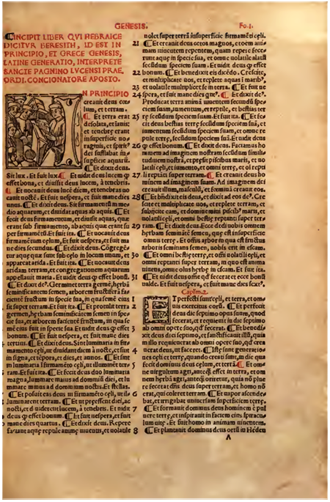
Liber Charlaceus
Tomus tertius et 4tus et vtus operus Melancthonis—iii s. iiii d. [1541]
Commentarius in rhetorica [] Ciceronis—iii s. iiii d. [1551]
Commentarii Doleti vol 2 libri due—xs. [Vol I 1536 | Vol II 1538]
Urbani [] grammatica graeca—viii d. [1497]
quarto
Institutiones Juris Civilis graecae—xii d.
Demosthenis [] Epistolae [1554], pars thucididis, Comaediae Aristophanis uno vol graeca—postilla pervetus
Opuscula quaedam Lutheri, Calvini, Bullingeri, Gualteri uno volumine in quarto—x
Claudius Sissellus de providentia—vi d. [1520]
Martir de Eucharistia—iiii d. [1549]
Martir in Epistolam ad Corinthios—iii s. [1551]
Casninus in Galatas—viii d.
Victoria papatus—xii d.
Calvinus in psalmos—xx d [1557]
Oecolampadius in Danielem—x d. [1530]
Retmanius de Justificatione—iii d
An Answere to the Crosse Anglice—x d. [James Calfhill, 1565 | EEBO text] 3
And Englishe booke for the government of women alias the harborow etc.—iiii d. [John Aylmer, 1559 | EEBO text]
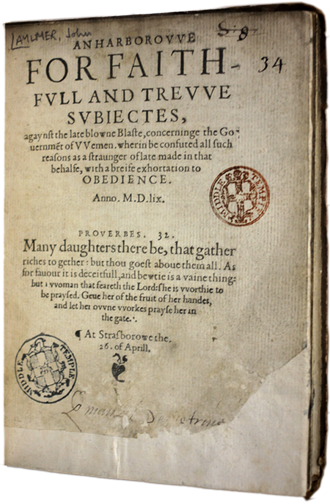
Lanaeterus in Josnan - xii d.
octavo
Petrus Lombardus—vi d. [Likely Libri Quattuor Sententiarum, e.g. 1576 | Wikipedia]
Liber Digestorum—viii d. 4
Opera quaedam minuta Augustini—iiii d.
Zodiacus vitae Anglice—vi d. [Palingenius | Transl. Barnabe Googe, 1565]
Liber vetus hieromini vidae de poetica—1 d.
Martir de Caelibatu et voti—12 d. [1559]
Lutherus in Ecclesiasten—4 d. [1532 | Transl. 1573: EEBO text]
[fo. 171v]
Wolfgangus Capito de Missa et iure magistratus—6 d. [1537]
Ecclesiasticae disciplinae liber—4 d. [Walter Travers, 1574 | Transl. Thomas Cartwright, 1574: EEBO text]
Sturmii [] prolegomena—4 d. [1541]
Pii poetae uno volumine—4 d. [1540]
Lutherus in 7 caput prioris ad Corinthios—4 d.
Carmina phocilidis graecco latina—2 d.
An English booke of divinity Commen places—4 d. [Wolfgang Musculus, 1563]
Catechesis Christiana—2 d. [Mattheus Galenus & Andrieu Du Crocquet, 1574]
De linguae graecae pronunciatione liber—3 d. [Thomas Smith, 1568]
Ars loquendi et tacendi [] Knanstino Autore—2 d. [1566] 5
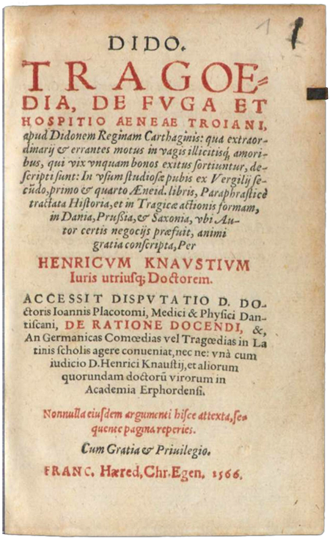
A viewe of mans estate englishe—2 d. [Andrew Kingsmill, 1574]
A Catechisme Englishe—1 d.
Nowels Catechismes two in Latin [1570], one in Englishe [Transl. Thomas Norton, 1570]
Portius de ponderibus et mensuris—1 d. [Leonardo de Portis, 1514]
the Sickmans salve—6 d. [Thomas Becon, 1561] 6
Melancthon de renovatione Ecclesiasticae disciplinae cum caeteris—6 d.
Liber de vitae et obitu Buceri Carro authore—6 d. 7
Prima pars Biblioni graece et Secunda graece, item at tertia—3 s. 4 d.
A faithfulll admonicion made by Knokes—2 d. [1554]
Varia poemata quorundam veteris de corrupto Ecclesiae statu—6 d. [Ed. Matthias Flacius Illyricus, 1557]
Liber psalmorum Davidis cum Annotationibus Stephani— [1546]
Gregorius Nissenus de opificio hominis [1567], cum opellis Ignatii—12 d.
Boetii [] Consolatio—14 d. [1523 | Wikipedia]
Epistolae [] Calvini duae—6 d. [1537]
Catechismus [] Calvini—2 d. [1538]
Beconus et Bertramus de Caena domini uno volumine—8 d. 8
The Anatomie of the Masse—4 d. 9
De religionis Conservatione, et de primatu magistratuum [] Laurentio humfredo autore— [1559]
Pandectae Scripturarum—6 d. [Otto Brunfels, 1527]
Oecolampadius in Mathaeu—6 d.
Oecolampadius in Joanni—6 d.
De compescendis animi affectibus [] Aloisius Luisinus—3 d. [1562]
Oecolampadius in Genesiu—5d.
Opera Erasmi quadam uno volumine—4 d. 10
Dionisius Carthusianus in Luca—5 d.
Ecclesiastes [] Erasmi— [1535 | Wikipedia]
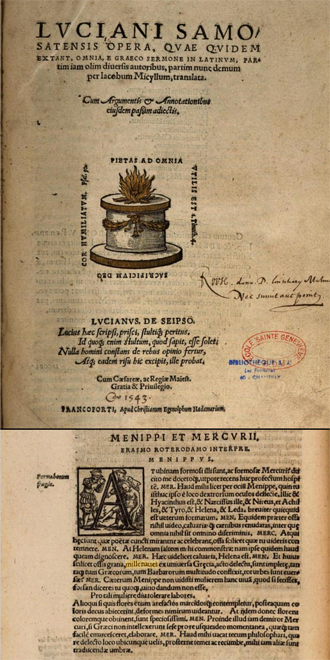
Sententia [] prosperi—8 d. [1524]
Virelus upon the Lordes Praier in Englishe—6 d. 11
Liber de differentia Ecclesiasticae et regalis potestatis—4 d. [Edward Foxe, 1534]
Apologia [] Erasmi adversus quosdam Monachos— [1528]
Herman Archbishop of Colenia in Englishe—6 d. [1547]
Peregrinatio Belgica—6 d.
[fo. 172]
Oecolampadius in 4 minores prophetas—6 d.
historia ecclesiastica [] Eusebii Latine—3 d. [1533 | Wikipedia]
Silva Bibliorum Hominis—6 d.
Oecolampadius in haebraeos—4 d. [1534]
Trahern Upon the Apocalipse Englishe— 12
fabritius in Abacuc [?] et prophetas minores —12 d. 13
Artopaeus in Genesiu—4 d. [1546]
Opera Cypriani aliquot 2 vol—16 d. [Volumes I | II, 1537]
Ratio perveniendi at veram theol. [] Erasmo autore—6 d. [1523]
Lutherus [] de servo arbitrio cum aliis—6 d. [1525 | Wikipedia]
Pomeranus in Epistolas Pauli—4 d. [1524]
The reliques of Rome— [Thomas Becon, 1563 | EEBO text]
Pandectes of the evangelical Law made by pannel English—6 d. [1553 | EEBO text]
Colonienses adversus Melancthonem et aliorum—5 d.
Anthologicon, id est florilegium graecorum aliquot—6 d. [Joannes Stobaeus, 1536]
Synesii [] Epistolae—6 d. [1558]
Lavaterus [] de spectris—6 d. [1569 | Transl. Robert Harrison, 1572: EEBO text | BL]
Olaus magnus de gentibus Septentrionalibus—8 d. [1555 | Wikipedia]
Catechismus ex decreto Concilii Tridentii—6 d. [1566 | Wikipedia]
hemmingius de superstitionibus vitandis—4 d. [1575]
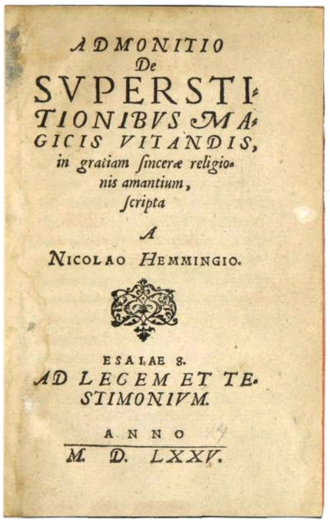
Sermones aliquot Oecolampadii—3 d.
Catechismus Carnuti—
A sermon of Porders Englishe—3 d [Richard Porder, 1570 | EEBO text]
Jewel [] against [] Cole— [1560]
Peter Viret [] Englished by Shute— [1565 | EEBO text]
Nowels [] Catechisme in Englishe 2 of them— [1570]
Doctor Smithes [] unwritten Verities—2 d. [1547] 14
Stephen Gardiners [] devels sophistry—o [1546]
Perrins sermons Englishe—2 d.
Aliquot orationes [] demosthenis conversae a Carro Anglo—6 d. [1571]
Wittingham of obedience to superior powers—2 d. 15
A treatise for ministers apparrel Englishe—4 d. 16
Marsilius ficinus de Christiana religione—6 d. [1559]
Methodus Confessionis—3 d. [Claude de Viexmont, 1532]
Knoxe upon praedestinacion—4 d. [1560 | EEBO text]
Confessio Saxonicarum Ecclesiarum—2 d. [Philip Melanchthon, 1552]
Quaestiones pueriles [] Joannis Agricolae—2 d. [1541]
Catechismus Anglicus autore Anonumo—2 d.
Liber de Commuratione Scoticae reginae—
Cranmers [] Confutacion of unwritten verities—4 d. [1556; see also footnote 14]
[fo. 172v]
Sillogisticon [] foxii—3 d. [1563]
The Christian state of matrimonie Englishe—1 d. [Heinrich Bullinger, 1543]
of obedience of Subjectes Englishe—2 d. 18
An Englishe booke of the disclosing of the greate bull—1 d. [Thomas Norton, 1570]
A booke of Songes and Sonnettes Englishe—1 d [Published by Richard Tottel, 1557 | EEBO text | Wikipedia]
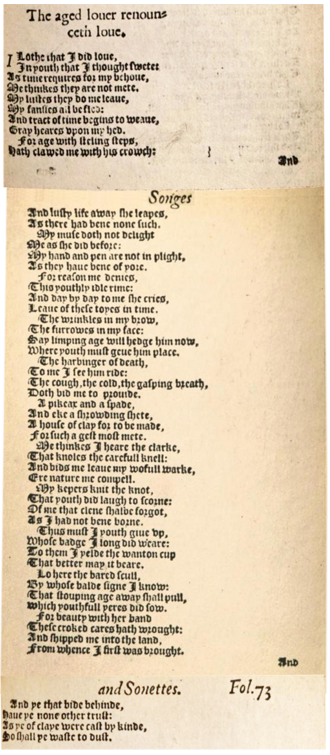
The philosopher of the Court in Englishe—2 d. [Le Philosophe de Court by Philbert of Vienne (Lyon, 1547), transl. George North, 1575]
Confessio Ecclesiarum helveticarum—4 d. [Confessio Helvetica prior (1536); Confessio Helvetica posterior, (1566)]
An Invective ageinst treason in Englishe—1 d. [Richard Morrison, 1539 | EEBO text]
Epistola Lutheri [] contra Sabbatharios—1 d. [1538]
The benefit of Christes death in Englishe—1d. ob [Tranlated by Arthur Golding, 1573] 19
Goughes [] answere ageinst fecknam— [1570 | EEBO text]
Norton’s admonicion to the Queenes subjectes—1 d. [1569]
An Admonicion in Scottishe— [George Buchanan, 1571 | EEBO text]
Against the use of Popishe garments in the Church—1 d. [Robert Crowley, 1566]
A politicke discourse—
An Informacion to the parliament englishe—ob [Robert Crowley, 1548]
Luciani dialogi aliquot—viii d. [Lucian of Samosata, Erasmus, Nicolas Buscoducensi, 1521]
Fentons [] discourse of the Warres in France—2 d. [1570] 20
An Englishe Catechisme—
Bonners Dirige—1 d. [Lemeke Avale, 1569 | EEBO text] 21
A sermon of Deringes—1 d. [1570] 22
An Englishe Catechisme—2 d.
Quaestiones [] Bezae—3 d. [1571] 23
A Sermon D fulcke— [1571 | EEBO text] 24
A warning ageinst papists—1 d. [Thomas Norton, 1569]
Calvinus de Praedestinatione—3 d. [1552]
A Sermon of Bradfordes—1 d. [1553]
Tragical discourses by the L Buckhurst— [1559 | EEBO text | Wikipedia] 25
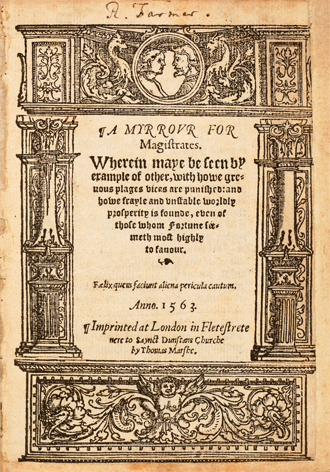
The fall of the Late Arrian—2 d. [John Proctour, 1549] 26
Vincentius Livinensis de Antiquitate fidei Cath —2 d. [1541]
Vives de Anima Libri tres—16 d. [1538]
Aristoteles [] de mundo—4 d. [1553]
Lexicon graecolatinum Ciceronianum—8 d. [Henri Estienne, 1557]
Institutiones fricksii Medicinales—10 d. 27
Gazae [] Grammatica Graeca—4 d. [1495]
Syntaxis linguae graecae [] Varennio authore—4 d. [1532]
Demosthenis et Aeschinis [] orationes contrariae—8 d. [Johannes Sturm, 1550]
Marcellus de proprietate linguae latinae—12 d. [1565]
Marsilii ficini opuscula—vi d. [Vols I & II, 1576]
[fo. 173]
Albertus magnus [] de formatione hominis—1 d. [1538]
Luciani [] dialogi Latini facti—8 d. [1576]
Digestorum liber secundus—8 d. [Justinian, e.g. 1569 | Wikipedia]
Hesiodus [] Graecolatinus—6 d. [Georg Henisch, 1580]
Budaei [] Annotationes in Pandectas—6 d. [1508]
Adrianus Cardinalis de Sermone Latino—3 d. [1513]
Platinae [] dialogus de falso et vero bono—2 d. [1465]
Some of Zenophon translated into Englishe—4 d.
Vives [] de Lingua Latina—2 d. [1538]
Polibius [] in Englishe—4 d. [1568]
Vives [] de disciplinis—12 d. [1531]
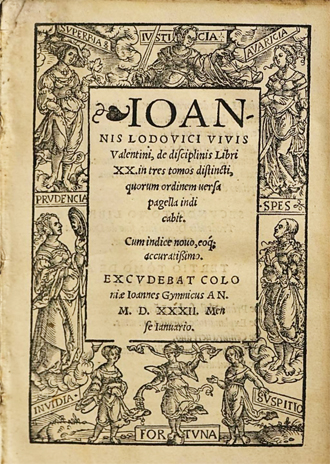
De ratione studii puerilis—6 d. [Juan Luis Vives, 1523]
Erotemata rhetorica [] Jodoci—8 d. [1555]
Sabellicus [] de moribus gentium— [1541]
Balduinus de Constantino Magno—20 d. [1556]
Caelius Secundus [] de Artificio Disserendi—4 d. [1547]
Sebastianus forius de historiae institutione—4 d. [1557]
Aristoteles [] de arte rhetorica graece—2 d. [1546 | Wikipedia]
Histora Sacramentaria de Caena—8 d.
Phocilidis [] Poema ἐλληνικον—2 d. [1539; "Greek"]
Nominis in Evangelium Joannis—3 d.
Alciattus [] de quinque pedum praescriptione—3 d. [1529]
Aristophanis [] Ειρηνή graece—2 d. ["Peace"]
Item thre Paper bookes—
Demosthenes [] Προς Λεπτινην—1 d. ["Against Leptines"]
bookes in decimo sexto
herodianus [] graece—4 d [1542]
Cominei [] historia—8 d. [1525] 28
Bellum grammaticale—1 d. 29
Galeni de Compositione pharmacorum—8 d. [1549]
Ilias [] homerii graece—6 d. [1551 | Wikipedia]
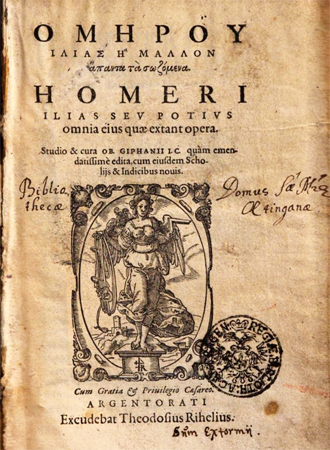
Petrus Crinitus—12 d. [De Honesta Disciplina, 1504]
Methodus medendi [] Galeno authore—10 d. [1545 | Transl. Thomas Gale, 1566: EEBO text]
Biel de Canone Missae—3 d. [1499]
Pentateuchus Moisis—4 d. [1542]
Catechismus [] Calvini Graecolatinus—4 d. [1575]
Gribaldus de ratione studendi—6 d [1541]
Contemplationes [] Idiotae—2 d. [1519]
Problemata [] Arist.—4 d. [1548]
Fenestella [] de Magistratibus—8 d. [1475]
[fo. 173v]
Knoxes Epistles—1 d.
Compendium theologicae veritatis—o [Hugh Ripelin of Strasburg, 1473] 30
Ovid [] de tristibus Englishe—2 d [Transl. Thomas Churchyard, 1572 | Wikipedia]
Nowels [] Catechismes in numbr v—12 d. [1570]
Plate and other things of the said Mr Greshops
Inprimus a pot of silver and gilt with a covir waying ix ounz one quarter at iii s ix d the ounce—xliiii s viii d
Item iii silver spones waying iiii ounces and a quarter—xx s. vi d.
Item a bosse of a gyrdle and a whistle ii ounces almos—ix s. vi d.
Item two gold Rings half an ounce—i s.
Sum of the plat—vi li. iiii s. viii d.
[fo. 174]
In the lower study
in folio
Imprimis [] Plato Latine—ii s. [1550]
Opera [] Petrarchi—vi s. [1554]
Scotus in 4um Sententiarum—viii d. [1580 | Commentary on Sentences by Peter Lombard (c.1150)]
Officia Ciceronis cum Commentario— 31
Munsteri [] Cosmographia—iiii s. [1544]
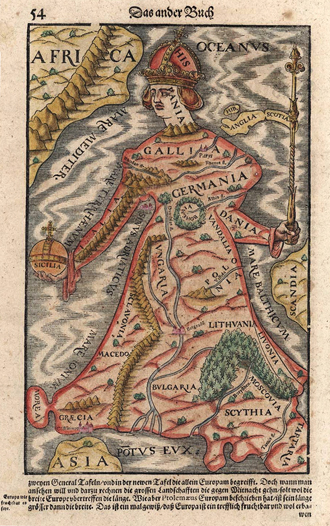
Thesaurus Ciceronis—vi s viii d. [Published by Carolus Stephanus, 1556]
Annotationes Erasmi in novum testamentum—iiii s. [1516 | Wikipedia]
Fabians [] Chronicle—iii s. [1516]
Biblia Latine—iii s. iiii d.
Biblia [] Castalionis—iiii s. [1551]
Martir in Judicum, et Samuelem—vi s. viii d. [1561, 1564]
Concordantiae Bibliorum—xii d. [Published by Robertus Stephanus, 1555]
Martir in Rom. Anglici—iii s iiii d. [1558 | Transl. Henry Billingsley, 1568: EEBO text]
Flores historiarum—iiii s. [Matthew Paris et al, 1570 | Wikipedia]
Familiares Epistolae [] Ciceronis cum Commentario—iis. vi d. [1545 | Wikipedia]
Chaucer—ii s. [Geoffrey Chaucer, 1542]
Boccatius de genealogia Deorum—ii s. [1472 | Wikipedia]
Loci Communes [] Martiris—v s. [Compiled by Robert le Maçon, 1576]
Galenus [] de temperamentis cum aliis—ii s. [1558]
A Geneva Bible—v s. [1560 | EEBO text | Wikipedia]
Virgilius cum Commentario—ii s. [e.g. Bucolica Virgilii, 1538]
Jewesl [sic] Defence of the Apologie—iiii s. [1566 | EEBO text]
Ovidii [] Metamorphosis cum Commentario—viii d. [1543 | Wikipedia] 32
In quarto
Grammatica [] Clenardi cum annnot. Antesignani—xii d. [1554]
Lavaterus in proverbia—xx d. [1562]
Aschams [] Schoolemaster—iiii d [1570 | EEBO text]
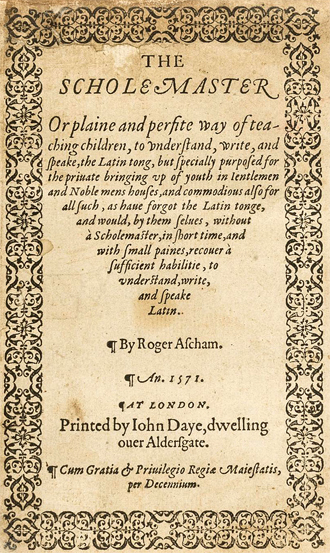
Camerarius et Alii in tusculanas quaest—xii d. [1538] 34
Dictionarium poeticum—xvi d. [Hermannus Torrentinus, 1498 | Editions]
Officia Ciceronis, cum diversorum Commentariis—xvi d. 31
Philo Judaeus in Decalogum—vi d. [1561]
Martir in Ethicam Arist.—ii s. [1563]
Valla de summo bono—viii d. [1512]
Langnettes [sic] Chronicles—xvi d. [Completed by Thomas Cooper, 1549 | EEBO text]
The Image of both Churches—iiii d. [John Bale, 1545 | EEBO text] 35
Psalterium Latinium—iiii d. [1561]
[fo. 174v]
Dionisius Carthusianus de orthodoxa fide—iiii d [Vols I & II, 1569]
Bibliand. de fatis Monarchiae Romanae— [1553]
Alworthus [?] contra de visibilim Monarchiam Saunderi—iii d [Bartholomew Clerke, 1573] 36
Cartwrightes [] replie ageinst Whitegift—ii d [1573] 37
Higini historia—iiii d. 38
Aristophanes Graec.—vi d [e.g. Aristophanis Comoediae, 1547]
Arist. [] Politica [] Strabaeo tralatore—iiii d [1549]
Wilsons [] logick English—viii d [1551 | EEBO text]
Some bookes of Ovides Metam. English—ii d. [Transl. Arthur Golding, 1567: EEBO text | Wikipedia] 32
the praise of foly Englishe—ii d. [Erasmus, 1511 | Transl. Sir Thomas Chaloner, 1549: EEBO text]
Haddoni Opellae—iiii d. 39
A discourse of the affaires in Germany by Ascham—ii d. [1570 | EEBO text]
Liber Juris Canonici prima pars—xii d.
In octavo
Institutiones [] Calvini—ii s. vi d. [1536]
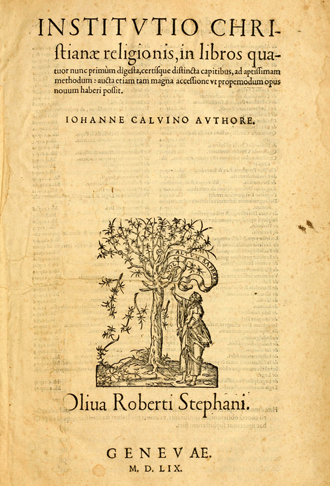
Plautus—xii d. [e.g. Plautus ed. Denis Lambin, 1576]
Grammatica Graeca [] Crusii—xx d. [1573]
Pii quidam poetae uno vol.—x d. [Pub. Johannes Oporinus, 1550]
Pars quarta [] Livii—vi d. [1568]
Diallacticon Sacramentarium Boquino autore—vi d. 40
Plutarchi quadam opuscula—viii d. [1530]
Terentius Cum Commentario—xii d. [1511]
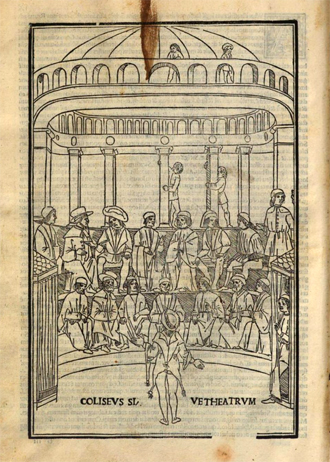
Sophiclis [] Tragaediae Latine—viii d. [1543]
Confessio [] Bezae, cum aliis—xii d. [1573]
Claudinaus [] poeta—xii d. [1534]
Locii Communes [] Joannis Manlii 41—xii d. [1562]
Facetia Bebetii [sic?] cum aliis—viii d. [Presumably Heinrich Bebel, 1506]
Facetia [] Brusonii—viii d. [1518]
A praesident for a prince—ii d. [Anthony Rush, 1566 | EEBO text] 42
Valentinus Erithraes de Conscribendis Epistolis—viii d. [1573]
Agrippa de vanitate Scientarium—vi d. [1527]
Apollinarius graecus in psalmos—vi d [1552]
Tusculanes Quaestions Englishe, wth the offices—vi d [Cicero | Transl. John Dolman, 1561]
Ovides [] Metamorphosis wth the pictures—viii d. [1563 | Wikipedia] 32
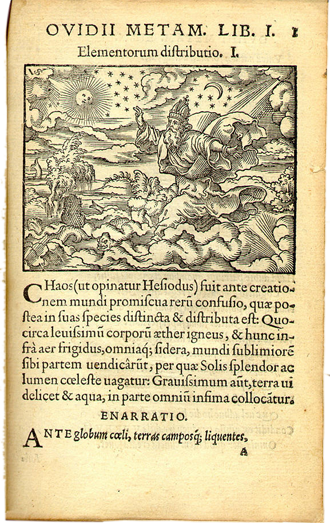
Syntaxis Languae graecae—iiii d [Johannes Varennius, 1532]
Linacri [] Grammatica—viii d [1512 | EEBO text]
Sophoclis [] Tragaediae graece—viii d. [1553]
[fo. 175]
Solinus [] polyhistor.—viii d. [1572]
A pretious perle, id est, an englishe booke so called—iii d. [ | Transl. Myles Coverdale, 1550]
Eliottes [] governor—vi d [1531]
Erasmus [] Enchiridion englishe—iii d. [1501; Transl. William Tyndale, 1533 | EEBO text | Wikipedia]
Castalionis [] Dialogi Sacri—xii d. [1542]
Catechismus [] Chytraei—iii d. [1554]
Physica, et Ethica [] valerii—iiii d. [1567]
De ratione discendae linguae Graecae—vi d. 43
Sadoletus [] de pueris instituendis—iiii d. [1538]
The new testament in Englishe—xii d.
Erotemata de Copia rerum et verborum, cum aliis—vi d. [Lucas Lossius, 1545]
Arithmetica [] Gemmae frisii—iiii d. [1540]
Processus Judiciarius [] Panormitani—ii d. [1502]
Aesopii [] fabulae—ii d. [1570]
Juvenalis—iii d. [e.g. Satyrae, 1557]
Orationes. 6. Isocratis sex exiguis sed distinctis vol—ii s. [1567]
Utopia [] Mori Latine—ii d. [1516]
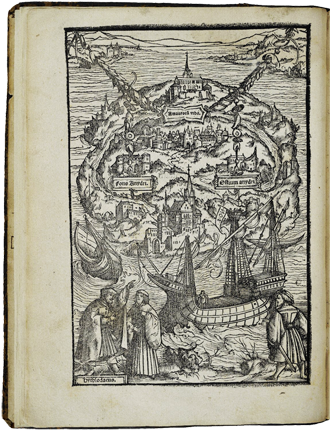
Theophil in evangelica—xii d. [1564]
Theoph. in Epistolas—xii d. [1564]
Homilae [] Bedae—viii d. [1534]
Cranmerus de Transubstantiatione—iiii d. [A Defence, 1550 | EEBO text]
Claris theologiae—iiii d.
Sermones de tempore—iiii d. 44
In decimo sexto
Fabritius de poetica—vi d [1566]
Flaminius in psalmos—viii d. [1546]
Novum testam. graece—viii d. [e.g. 1574]
Epistolae ad Atticus—xii d. [Cicero, 1544]
Epistolae familiares—vi d [Cicero, 1578]
Commentarii Caesaris—vi d. [Gaius Julius Caesar, 1578]
Flaminii [] paraph. in 30 psalmos cum aliis—iiij d. [1546]
tres lib. de vitis Imperatorium Romanorum—ii s. 45
Preces Sacrae—iiii d. [Peter Martyr Vermigli, 1564 | Transl. , 1569: EEBO text]
Officia Ciceronis et Terentius uno vol—xii d.
Testamentum graecis in duabus partibus—x d.
Frutisius de medendi—viii d. 46
Sibillina Oracula cum aliis—vi d. [Ed. Sebastian Castellio & Xystus Betuleius, 1546 | Wikipedia]
[fo. 175v]
Virgilius—viii d. [e.g. Pub. Virgilius Maro, 1558] 47
Manutii [] Epistolae—viii d. [1558]
Libri proph. omnium—vi d. 48
Palingenius—vi d. [Zodiacus Vitae, 1536]
Aulus Gellius—xii d. [Noctes Atticae, 1571]
Concordantiae biblioni et Canonum perexignae—ii d. [Johannes, Abbot of Nivelles, 1487]
Ephemerides Phialo—ii d. [Stephen Gosson, 1579 | EEBO text] 49
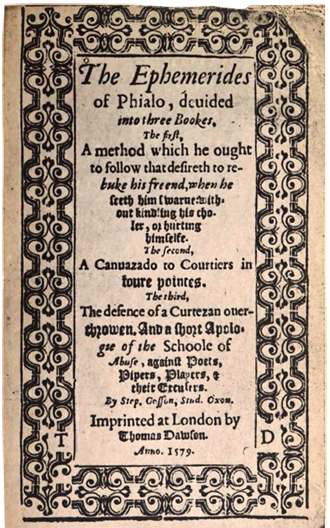
A Dispraise of the Courtiers Life—ii d. [Transl. Sir Francis Bryan, 1548] 50
A praeparacion to the Lordes Supper—i d. 51
A touche stone for this praesent time—i d. [Edward Hake, 1574]
Symbola [] Joannis Laezii—i d. [1560]
Vassaeus de Judicio Trinarum—i d. 52
Summa totalis Invm—xlvi li xii s. x d.
Priced by Mr John Hill Prebendarye 53 in ch[r]ists churche in Canterbury Frauncis Aldriche 54 and [Robert] Rose 55 the ii Martti 1579 [1580]
Besides the bookes above named there are of old rustie bookes about xviii
Monye found after his deathe
Inprimis a spurre royall and a frenshe crowne of the value of—xxi s.
Item in mylle sixepences and Edward twelvepenns—xix s. vi d.
Item in pence and thre halfe pence—xl s.
Item in ready sylver in the tawnye purse—iiii li ii s. xi d.
Item in an other purse—ii s. x d.
Summa Totalis viii li. vi s. iii d. 56
Footnotes:
- Note 1: KHLC = Kent History and Library Centre, Maidstone; see Probate Records of Canterbury (1396-1858) (PRC): PRC 21/4 Accounts and Inventories (1579-1580). Back to Text
- Note 2: John Gresshop had been Headmaster at the King's School in Canterbury since 1566 and this inventory was taken 23 February 1580, about one or two months after his death. Back to Text
- Note 3: A reply to John Martiall's A Treatyse of the Crosse (Antwerp, 1564). Back to Text
- Note 4: Perhaps Justinian's Digestorum?. Back to Text
- Note 5: Heinrich Knaust (1520-1580), a humanist teacher, also wrote some plays for use in schools, including Dido (Frankfurt am Main, 1566). Back to Text
- Note 6: Mentioned in the play Eastward Hoe by Chapman, Johnson & Marston (1605): Wolf: He is so well given, and has such good gifts. He can tell you almost all the stories of the Book of Martyrs, and speak you all the Sick Man's Salve without book. [V.ii] Back to Text
- Note 7: Perhaps Epistola de Morte Buceri ad Johannem Checum (London, 1561) by Nicholas Carr which was also included in Historia Vera de vita, obitu ... Martini Buceri et Pauli Fagii by (Strasburg, 1562). Back to Text
- Note 8: Perhaps Thomas Becon and the 9th century monk Ratramnus who became known as Bertram, author of De Corpore et Sanguine Domini and whom Cranmer's chaplain Becon was fond of quoting (Bertram and the Reformers, p.115). Back to Text
- Note 9: Perhaps An Anatomi, that is to say a Parting in Peeces of the Mass (Strasbourg, 1556) [EEBO text] by Agostino Mainardi under the pseudonym Anthoni de Adamo. The work was orignally published in Latin as Anatomia Missae (1550) and then in Italian as L'Annatomia della Messa. Back to Text
- Note 10: A collection of all Erasmus' works was published in nine volumes in 1540: I | II | III | IV | V | VI | VII | VIII | IX. Back to Text
- Note 11: Perhaps A Notable Collection of Diuers and So[n]dry Places of the Sacred Scriptures which make to the Declaratyon of the Lordes Prayer originally collected by Pierre Viret in French, and translated into English by Anthony Scoloker (London, 1548). Urry transcribes the author's name as "Tirelus" and Kuriyama as "Virelus". Back to Text
- Note 12: Perhaps Bartholomew Traheron, who wrote An exposition of a parte of S. Iohannes Gospel... (1557; EEBO text) and An exposition of the 4 chap. of S. Joans Reuelation... (1558). Back to Text
- Note 13: Perhaps In Habakuk Prophetam V. Fabritii Capitonis enarrationes by Wolfgang Fabricius Capito (1526)? Back to Text
- Note 14: Cranmer's A Confutation of Vnwritten Verities (London, 1556), published just after his death, was a response to A Brief Treatyse Settynge Forth Diuers Truthes... by Doctor Richard Smith (London, 1547). Back to Text
- Note 15: William Whittingham contributed a dedicatory epistle to Christopher Goodman's How superior powers oght to be obeyd of their subiects and wherin they may lawfully by Gods Worde be disobeyed and resisted (Geneva, 1558). Back to Text
- Note 16: Perhaps The iudgement of the Godly and learned father M. Henry Bullinger ... declaring it to be lawfull for the ministers of the Churche of Englande, to weare the apparell prescribed by the lawes and orders of the same realme. by Heinrich Bullinger (London, 1566). The subject of ministers' apparel might also suggest A briefe discourse against the outwarde apparell and ministring garmentes of the popishe church by Robert Crowley (London, 1566), but this is listed seprately later in the inventory. Back to Text
- Note 17: This is likely a mistranscription in the original inventory for Dialogus de Veneficiis written by Lambert Daneau in 1564 on the subject of witchcraft. The 1574 edition of Daneau's work was translated into English by Thomas Twyne, son of the King's School's first headmaster John Twyne, as A Dialogue of Witches (1575). Perhaps Twyne used this very edition of Daneau's text in Gresshop's library as his source for translation. Back to Text
- Note 18: Perhaps A Treatise or Sermon ... Concernynge Magistrates and Obedience of Subiectes by Heinrich Bullinger (London, 1549 - EEBO text). Back to Text
- Note 19: Golding "[t]ranslated out of French"; the original Trattato Utilissimo del Beneficio di Giesu Christo crocifisso (Venice, 1543) that has been attributed to Aonio Paleario, was revealed to have been written by a Benedictine monk Benedetto da Mantova and edited by Marcantonio Flaminio | Wikipedia. Back to Text
- Note 20: Geoffrey Fenton's translation of a recent work by Jean de Serres was published in London in 1570, and covers the first three wars of religion in France up until that date. This could have given the young Marlowe some background and an interest in the subject, although his later dramatisation The Massacre at Paris (c.1592) begins with the St Bartholomew's Day Massacre in 1572. Back to Text
- Note 21: Entitled "A commemoration or dirige of bastarde Edmonde Boner, alias Sauage, vsurped Bisshoppe of London. Compiled by Lemeke Auale. Anno Domini. 1569.". Published on the Catholic former bishop's death, compiled by the pseudonymous Avale. Back to Text
- Note 22: Alternatively A sermon preached at the Tower of London, by M. Dering the xi. day of Dece[m]ber. 1569. Back to Text
- Note 23: A second volume was published in 1576. Arthur Golding produced an English translation A booke of Christian Questions and Answers (London, 1572) | EEBO text. Back to Text
- Note 24: Other sermons by William Fulke were published in 1574, 1577 and 1580. Back to Text
- Note 25: The Mirror for Magistrates was a collection of poems by different authors, each providing a discourse on the life and tragic end of a historical figure to be held up as a mirror for people to judge and learn from. It was first published in 1559 comprising 19 lives, with further editions under different editors published in 1563, 1574, 1578 and later, each adding other lives. Although only contributing two poems first included in the 1563 edition, the entire work seems to have often been ascribed to , perhaps because he was the best known contributor and that his pieces boasted most literary merit. Back to Text
- Note 26: The Fal of the late Arrian (London, 1549) was written by the academic and historian John Proctour supposedly about the anti-trinitarian priest John Assheton. Proctour, a Catholic, included 'heretical' unitarian quotes in order to rebut them. It was three pages from this tract that were discovered in Thomas Kyd's room when it was searched by the authorities in May 1593, and deemed "vile heretical Conceiptes denyinge the deity of Jhesus Christe o[u]r Savior" [British Library, Harley MS 6848, fols. 187–9] that led to Kyd's arrest. Kyd pleaded innocence, claiming that the pages were just "fragments of a disputation" and were in fact Marlowe's, "shufled wth some of myne (unknown to me) by some occasion of wrytinge in one chamber twoe yeares synce" [BL, Harley MS 6849, fols. 218–218v]. Back to Text
- Note 27: Perhaps Institutionum Medicinae ad Hippocratis, Galeni, aliorumque veterum scripta... by Leonhart Fuchs (1555). Back to Text
- Note 28: Although published after Gresshop's inventory was taken, for reference there was an English translation by Thomas Danett entitled "The Historie of Philip de Commines" (London, 1596) (originally written "thirty yeeres since") which is available online via a publication in 1897 by David Nutt in two volumes: Vol I | Vol II. Danett also subsequently published his own A Continuation of the Historie of France... (London, 1600) covering the period from 1498-1559. Back to Text
- Note 29: The genre of the "bellum grammaticale" was popular in the 16th and 17th centuries and used as a means to satirise outmoded styles and present a new method of instruction in the form of a grammatical battle or war. One of the best known was written by the Italian Andrea Guarna (Cremona, 1511) and was published in many countries, including for example an edition "turned into English by W(illiam).H(aywarde)." (London, 1569). Back to Text
- Note 30: The original work (c.1268) is now generally attributed to Hugh Ripelin of Strasburg, having been previously attributed to others, most notably Hugo's contemporary Albertus Magnus (c. 1200-1280). Back to Text
- Note 31: There were many editions, but perhaps one with a commentary may refer to Libri III de officiis cum Hieronymi Wolfii commentariis (1563), a commentary by Hieronymus Wolf (1516-80). Back to Text
- Note 32: Marlowe produced a translation of Amores as Ouid's Elegies, but also clearly knew and was influenced by Metamorphoses in for example his Hero & Leander and Tamburlaine - see for example Anthony Brian Taylor, Notes on Marlowe and Golding, Notes and Queries, 34.2 (1987), pp. 191–193. Back to Text
- Note 33: Foxe completed and published Contra Hieron. Osorium... (London, 1577), a second unfinished rejoinder by Walter Haddon to the Portuguese priest Jerónimo Osório, who had written an epistle translated into English as A Pearl for a Prince (Antwerp, 1565) urging Queen Elizabeth to return to the Roman Catholic communion and accept papal authority. Richard Hillman suggests that the nature of Osório's diatribes was an inspiration to Thomas Kyd for the character of Hieronimo in The Spanish Tragedy - [see Thomas Kyd, The Spanish Tragedy, in T. Betteridge & G. Walker (eds), The Oxford Handbook of Tudor Drama (OUP, 2012) pp. 566–83]. Back to Text
- Note 34: Commentaries on Book V of Tusculanae Quaestiones by Cicero. Back to Text
- Note 35: The author John Bale (1495-1563) had previously written a number of mystery and miracle plays in the 1530's, very much anti-papist in nature, and also notably what is perhaps one of the oldest English language historical dramas, Kynge Johan (c.1538). Although before Marlowe's time at the King's School, it is probably no coincidence that there was funding for school dramas during Bale's time as a prebendary at Canterbury Cathedral from 1560 until his death three years later. Back to Text
- Note 36: Catholic priest Nicholas Sanders had written De Visibili Monarchia Ecclesiae (Leuven, 1571) on the sufferings of English Catholics. Lord Burghley and Archbishop Matthew Parker felt a strong published response refuting Sanders' claims was needed by someone with expertise in civil law. MP Bartholomew Clerke was selected to write the response, aided by Parker, vetted by Burghley, and published as Fidelis Servi Subdito Infideli Responsio... by John Day in 1573. The first word here of this entry in the Gresshop inventory is evidently difficult to make out: [Urry-Canterbury] (p.120) transcribes it as "Rom'archijs" whilst [Kuriyama] (p.188) wonders if it might read "Alworthus [?]". Clerke was appointed Dean of the Arches in May 1573 and would have been known in Canterbury, but neither he nor any other is named as author in the published response, so it is difficult to guess what was intended here in Gresshop's inventory. Back to Text
- Note 37: This is presumably Cartwright's first reply to Whitgift published in 1573. Thomas Cartwright and John Whitgift had become fierce enemies after the latter instigated the puritan's expulsion from Cambridge University in 1570, and the pair waged a heated argument via published pamphlets over five years from 1572-77, initiated by two entitled An Admonition to the Parliament, the second by Cartwright. Back to Text
- Note 38: Perhaps the publication of a work by Gaius Julius Hyginus (c.64 BC–AD 17). His Poeticon Astronomicon (Cologne, 1534), describing the myths associated with the constellations had first been published in Venice in 1487. Hyginus' invaluable collection of myths included in Fabulae was first transcribed and published by Jacob Micyllus in 1535. Back to Text
- Note 39: Perhaps a work by Walter Haddon (1516-72), whose second response to Jerónimo Osório (unfinished at his death and completed by John Foxe in 1577) is listed earlier in Gresshop's inventory. Haddon authored the first response to Osório sponsored by the English government, which was published in Latin and entitled "Gualtheri Haddoni pro Reformatione Anglicana Epistola Apologetica ad Hier. Osorium, Lusitanum" (Paris, 1563/4). Haddon also included this letter in his collection of orations and letters, Lucubrationes (London, 1567) - p.210 onwards. An English translation of Haddon's initial reply by Abraham Hartwell was published as A Sight of the Portugall Pearle (London, 1565). Haddon also published a collection of Poemata (London, 1567) but nothing that might be identified unequivocally by the inventory reference to Opellae ('small works' or 'trifles'?). Back to Text
- Note 40: [Urry-Canterbury] transcribes the author as "Boquino" (p.120) and [Kuriyama] as "Boqnino [?]" (p.188). Could this perhaps refer to the converted Italian reformer Bernardino Ochino (1487–1564) as B.Oquino? There is a link between Ochino and John Ponet (c.1514-56) who is attributed author of Diallacticon Viri Boni et Literati, de Veritate, Natura et Substantia Corporis et Sanguinis Christi in Eucharistia., first published in 1557 (edited by Anthony Cooke and published the year after Ponet's death). Ochino lived in England between 1547 and 1553 where he was befriended by Cooke, made a prebendary of Canterbury Cathedral and wrote Tragoedie or Dialoge of the Vnjuste Vsurped Primacie of the Bishop of Rome, which was translated by Ponet and published in 1549. Back to Text
- Note 41: (not to be confused with the printer of the same name working in Hungary 1582-1605) was a student of Philip Melanchthon (author of Loci Communes, 1521) and was active between c.1548 and 1563. Manlius produced a number of collections of these Christian "common-places" containing those from the lectures of Melanchthon and others. Manlius includes in this work an account of Johannes Faustus based on information from Melanchthon: "Another posthumous account is that of Johannes Manlius, drawing on notes by Melanchthon, in his Locorum communium collectanea dating to 1562. According to Manlius, Johannes Faustus was a personal acquaintance of Melanchthon's and had studied in Kraków. Manlius' account is already suffused with legendary elements, and cannot be taken at face value as a historical source. Manlius recounts that Faust had boasted that the victories of the German emperor in Italy were due to his magical intervention. In Venice, he allegedly attempted to fly, but was thrown to the ground by the devil." [Wikipedia]. Could this book in Gresshop's library have provided the student Marlowe with his first intriguing introduction to Faustus? Back to Text
- Note 42: Anthony Rush (1537–1577), a former pupil, succeeded John Twyne as the second headmaster of the King's School in 1561 aged about 24. He left the post in 1565 to become chaplain to Thomas Radclyffe, Earl of Sussex, and a year later published A President for a Prince, Wherein is to be seene by the testimonie of auncient writers, the duetie of kings, princes, and gouernours (London, 1566). He later became Chaplain to the Queen, and Dean of Chichester. Back to Text
- Note 43: Possibly (one part of?) De Ratione Discendae Docendaeque Linguae Latinae et Graecae by Antonius van Schore (Strasbourg, 1549). Back to Text
- Note 44: Sermones de tempore [et de Sanctis] was not a unique title e.g. Sermones de tempore et de sanctis by Albertus Magnus (Augsburg, 1478), or Sermones de Tempore by Johann Herolt (1418). Back to Text
- Note 45: Quite possibly The Twelve Caesars by the Roman historian Suetonius (69-122), edited and annotated by Erasmus and Egnazio (1518). Editions entitled C. Svetonii Tranqvilli XII. Caesares comprising "tres libri" were later published by Sebastian Gryphius in Lyon, starting in 1547. Back to Text
- Note 46: If "Frutisius" was perhaps mis-transcribed in the inventory instead of "Fuchsius", this might refer to De Medendis... by Leonhart Fuchs (Basel, 1539). Back to Text
- Note 47: One of Virgil's most famous works is of course the epic poem The Aeneid, from which Marlowe used source material for Dido, Queen of Carthage. Back to Text
- Note 48: Perhaps on the Old Testament books of the major and/or twelve minor prophets, for example Prophetae Isaias, Ieremias, Barvch, Ezechiel, Daniel: cvm duodecim aliis minoribus (Antwerp, 1567). Back to Text
- Note 49: Stephen Gosson (1554-1624) was ten years older than Marlowe, and like him born in Canterbury and baptised in St George's Church. Gosson also attended the King's School whilst Gresshop was headmaster, and is listed as a King's Scholar in the academic year 1567-8. [ & , Schola Regia Cantauriensis: A History of Canterbury School commonly called the King's School (London, 1908), p.90]. He attended Corpus Christi, Oxford, and at some point tried his hand at writing play(s), but is best known for his tract The Schoole of Abuse conteining a plesaunt inuectiue against poets, pipers, plaiers, iesters, and such like caterpillers of a comonwelth (London, 1579). After Thomas Lodge responded, Gosson quickly replied himself with this second tract, The Ephemerides of Phialo, in the same year (1579). Back to Text
- Note 50: Bryan (c.1490-1550) produced his English translation (London, 1548) from a French translation Du Mespris De La Court... (Paris, 1542) by (1500-70) of the original work Menosprecio de Corte y Alabanza de Aldea (Valladolid, 1539) written by the Spanish bishop and writer Antonio de Guevara (c.1481-1545). Back to Text
- Note 51: Perhaps A Treatise of the Preparation to the Holy Supper by (1540-1601), "Ttanslated [sic] out of French into English by R.B." (London, 1570). Back to Text
- Note 52: Possibly De Judiciis Vrinarum Tractatus (Paris, 1548), a medical treatise on urine by "Joanne Vasseo", also known as "Johannes Vassaeus" in Latin, whose native name was of Meaux (1486-1550), and who also translated Galen's commentary on Hippocrates' Epidemics (1531). An English translation The Ivgemēt of Oryne by Humphrey Llwyd (1527–1568) was published in London in 1553. If this was the actual book in Gresshop's library, it could be a (somewhat amusing) mis-transcription of the book's title by those recording the inventory. Back to Text
- Note 53: Canon John Hill was prebendary at Canterbury Cathedral from 1567 until his death in 1597. "JOHN HILL, alias, Bury, of Christ-church, in Oxford, who had succeeded dean Nowel in the prebend of Westminster, resigning it in 1567, was installed prebendary of this church June 29th that year, and his predecessor John Pory was admitted to the canonry of Westminster in his room; so there seems to have been a mutual exchange of these dignities. He was afterwards vicar of Minister, in the Isle of Thanet, and dying in 1597, was buried in this cathedral. His wife Mary survived him, and dying at the latter [e]nd of the same year, was buried near him." - Edward Hasted, Canterbury Cathedral: Canons, in The History and Topographical Survey of the County of Kent: Volume 12 (Canterbury, 1801), p.85 at British History Online [accessed 09 September 2023]. Back to Text
- Note 54: Francis Aldrich was registrar of the Archbishop’s Consistory Court of Canterbury from 1567 until his death in 1602, and lived next to St. Margaret's Church (on St. Margaret's Street) where he also privided accomodation to Marlowe's former school-mate Leonard Sweeting when he was apprenticed to Aldrich. Aldrich's son Simon would much later provide some information about Marlowe's time at Cambridge University that Henry Oxinden recorded in his common-place book in 1641: "Mr Ald. said that Mr Fineux of Dover was an Atheist & that he would go out at midnight into a wood, & fall down upon his knees & pray heartily that the Devil would come, ... he learned all Marlowe by heart & divers other books: Marlowe made him an Atheist..." [Urry-Canterbury] pp.50 and 60-61. Back to Text
- Note 55: Robert Rose was Lower Master (or 'Usher') at the King's School under Gresshop and his successors from 1567 until 1585, and therefore would likely have taught Marlowe in the lower three forms. Rose was also a former pupil, listed as a King's Scholar 1561-2. After leaving the King's School he resided in the village of Bishopsbourne, four miles south-east of Canterbury, where in 1600 he was witness to the will of the theologian Richard Hooker. In 1618, he gave land in Romney Marsh for the benefit of the King's School 'Exhibitions', and died two years later, being buried in the Cathedral on 31 May 1620. He bequeathed £100 by his will to the Blue Coat School located in the poor priests' hospital in Stour Street (now home to the Marlowe Kit) [ & , 1908 - p.91]. Back to Text
- Note 56: Full transcript of John Gresshop's estate can be found in both [Urry-Canterbury] Appendix II pp.108-122, and [Kuriyama] Appendix pp.179-190. Back to Text